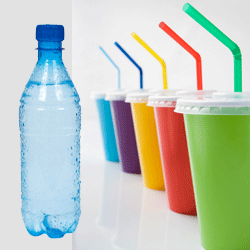Preschool and daycare may be the most effective settings for programs aiming to limit sugary beverage consumption in young children, according to a new study led by researchers from Harvard T.H. Chan School of Public Health.
The study also identified several strategies that may help keep kids away from soda and other sugary drinks, including limiting access to these beverages, offering in-person educational programs for children and parents, and training childcare and health care providers in how to reduce sugary beverage consumption.
“Nearly half of children in the U.S. aged 2 to 5 years drink sugar-sweetened beverages on any given day,” said first author Kelsey Vercammen, SM ’18, a PhD student in the Department of Epidemiology. “It is particularly important to limit drinks like soda and fruit punch in infants and preschoolers because we’ve seen that regular consumption at a young age promotes a persistent desire for sweetness.”
The study was published July 18, 2018 in Obesity Reviews.
Substantial evidence links sugar-sweetened beverage (SSB) consumption to negative health effects including tooth decay, weight gain, and insulin resistance.
Vercammen and colleagues reviewed 27 studies published between 2000 and 2017 that looked at a range of interventions to reduce sugary beverage consumption in children aged 0 to 5. The studies included both randomized controlled trials and evaluations of single groups of children before and after an intervention, and occurred in settings such as preschool and daycare centers, doctors’ offices, and participants’ homes.
No single strategy was universally successful but some were promising, Vercammen said. Interventions that worked well often included more frequent sessions between study participants and health educators, and used behavior change techniques such as counseling sessions or role playing.
Most successful interventions also included multiple strategies. For example, a study of preschoolers in six European countries included group education for the children, installation of water fountains in classrooms, and educational materials for parents. Although the program did not bring down kids’ soda or sweetened milk consumption, it did prompt a significant reduction in consumption of fruit juice.
All of the studies targeting racial and ethnic minorities and more than half of the studies targeting low-income children were successful in moving kids off sugary drinks. Vercammen said that the use of culturally relevant strategies in some of the studies—including materials in Spanish delivered by local community members—may have contributed to their success.
Vercammen was surprised to see that few of the studies considered policy interventions such as soda taxes or warning labels on sugary drinks. Most looked at efforts to change individual behaviors. She said that it will likely take a few more years before there is a strong body of evidence about the effectiveness of various policy- or community-level approaches for young children.
Given the ubiquity of SSBs in modern life, Vercammen said that researchers have to stay realistic.
“Children are not going to suddenly stop drinking sugary beverages, so public health efforts should focus on reducing consumption of these drinks while simultaneously shifting children to healthier beverages,” she said.
Vercammen, senior author Sara Bleich, professor of public health policy, and colleagues hope to develop evidence-based recommendations for limiting SSBs as well as to identify culturally appropriate beverage alternatives.
Source: hsph.harvard.edu













